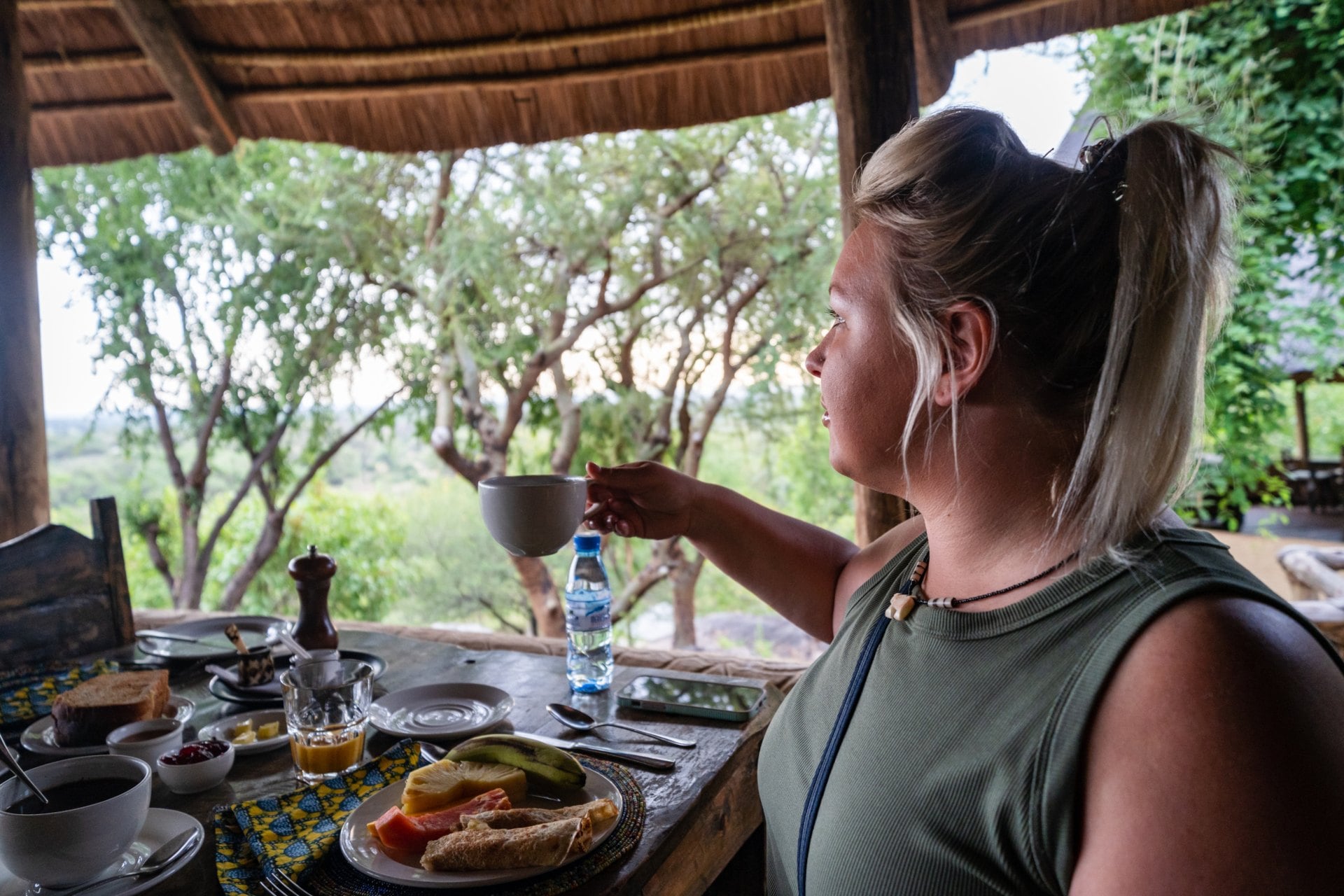Food & Drink
A reflection of the country’s rich cultural tapestry, meals in Tanzania are fresh, flavourful, and meant to be shared, often served family-style in homes and open-air eateries.
Whether you’re sampling grilled streetside mishkaki in Arusha or enjoying a candlelit dinner at a luxury Serengeti lodge, food here is a sensory experience that ties you to the land and its people. Expect spices, warmth, and generous hospitality.
To start planning your own culinary odyssey through the country, which includes the island of Zanzibar, talk to one of our Destination Specialists today.
A Culinary Overview of Tanzania
Tanzanian cooking draws from a wide array of influences—Arab, Indian, African, and even colonial European—all grounded in fresh, local ingredients.
Core staples include maize, rice, coconut, cassava, and a variety of spices. Ugali, a maize-based porridge, is the foundation of many meals, often served with nyama choma (grilled meat), sukuma wiki (collard greens), or spiced beans.
Samosas and chapati reflect Indian roots, while dishes like coconut rice and spicy curries are hallmarks of Swahili coastal cuisine.
Regional variations are vast. On the coast and in Zanzibar, seafood takes centre stage, often simmered in coconut milk or served grilled with a squeeze of lime. In the highlands around Arusha and Kilimanjaro, hearty stews and roasted meats are more common, reflecting cooler mountain climates.
No matter where you travel, food is woven into the rhythm of daily life—flavourful, nourishing, and always enjoyed among company.
Unique Tanzanian Dining Experiences
Dining in Tanzania is as much about setting as it is about flavour. Along the coast and on the island of Zanzibar, seafood restaurants serve the daily catch grilled to perfection, often right on the beach.
Inland, nyama choma—Tanzania’s beloved grilled meat—is enjoyed in open-air roadside joints, with locals gathering over plates of beef, goat, or chicken, usually served with ugali and a side of lively conversation. Markets here buzz with vendors selling fried plantains, samosas, and fresh sugarcane juice, making street food an essential part of the experience.
On Zanzibar, food tours uncover the island’s aromatic soul—spice farms offer hands-on insights into clove, cinnamon, and nutmeg cultivation, while Stone Town’s night market lets you graze your way through grilled seafood skewers, coconut breads, and Zanzibar pizza (a folded, savoury street-food pancake).
For something more elevated, lodges in the Serengeti and Ngorongoro serve multi-course meals under the stars, often featuring a fusion of local ingredients with international flair.
“Lunch at the Arusha Coffee Lodge is a must,” says Destination Specialist Brooke Theron. “And Gibbs Farm near Ngorongoro? Their buffet lunch—made entirely from their own gardens—is unforgettable.”
Destination Specialist Kelley Cleaveland concurs. “Arusha Coffee Lodge,” she says, “is a lovely stop near Kilimanjaro Airport, perfect for shopping local crafts or getting a glimpse into village life.”
Before your trip, check out these Tanzania travel and etiquette tips to make the most of your culinary adventures.
Tanzania’s Beverage Scene
Tanzania’s beverage culture is as distinctive as its landscapes. “You’ll eat incredibly well on safari,” says Destination Specialist Kelley Cleaveland, “but drinks are just as memorable, especially that champagne breakfast after a hot air balloon ride over the Serengeti.”
Among Tanzanians, local beers like Safari, Kilimanjaro, and Serengeti are staples at gatherings, while pombe - a traditional, locally brewed fermented drink made from maize or millet - is often brewed and shared in rural areas.
In Zanzibar and along the coast, palm wine offers a sweet, low-alcohol alternative, typically tapped fresh from the tree. A small but growing wine industry exists around the Dodoma region on the mainland, and locally produced wines can now be found on menus in hotels, lodges, and restaurants across Tanzania.
Travelers can deepen their connection with the land through tastings and tours: sip a sundowner G&T overlooking the savannah, try house-made liqueurs at a spice farm, or enjoy a private cocktail hour after a bush walk. The choices are rich and varied.
Dining Etiquette in Tanzania
In Tanzania, says Destination Specialist Brooke Theron, “the locals treat you with respect and take such good care of you. It’s part of the culture of hospitality you feel everywhere.”
Typically, dining is communal and relaxed, with dishes like ugali, grilled meats, and spiced vegetables placed at the centre of the table to be shared. Whether you're in a family home or a roadside eatery, expect a warm welcome and genuine conversation. In larger cities and tourist hubs, dinner often begins later in the evening, especially at upscale restaurants and hotels.
Tipping in Tanzania is both appreciated and customary. Gratuities should go to restaurant servers, hotel porters, and especially your safari guide, who often plays the role of driver, wildlife expert, and cultural interpreter all in one.
To understand the deeper traditions behind Tanzania’s warm hospitality and shared meals, explore our guide to Tanzanian cultural traditions.
Accommodating Dietary Needs in Tanzania
Tanzanian cuisine is naturally accommodating to a variety of dietary needs. Vegetarian travelers will find an abundance of plant-based staples, such as sukuma wiki (braised collard greens), maize-based ugali, coconut rice, and lentil stews. Samosas, chapati, and vegetable curries are widely available, particularly in markets and along the Swahili coast. In more urban areas and high-end lodges, gluten-free and other special dietary options are commonly available with advance notice.
“While on safari,” says Destination Specialist Kelley Cleaveland, “you’ll eat incredibly well. Even if the meals are more international, the hospitality and care are local.”
During the Muslim fasting season of Ramadan, you may also encounter special iftar dishes prepared after sundown, adding another layer of cultural richness to the experience.
Plan Your Tanzanian Culinary Adventure
Food in Tanzania isn’t just a highlight; it’s a window into everyday life, culture, and connection, too. Whether you’re sampling coconut-laced kuku paka (chicken curry) at a coastal café or enjoying a chef-prepared bush dinner under the Serengeti stars, the country offers countless ways to engage the senses.
In Zanzibar, you can tour a spice farm, shop local markets with a guide, or learn how to prepare ugali and mchuzi wa samaki (fish stew) in a cooking class. For something more intimate, opt for a private chef experience at your luxury lodge or enjoy a farm-to-table lunch at places like Gibbs Farm, a working farm in the Karatu region that Destination Specialist Kelley Cleaveland calls “a gem, with everything grown on-site.”
From street food to fine dining, Tanzania’s culinary scene is fresh, rooted, and full of flavour. Book your custom Tanzanian food and wine journey with Goway today.
FAQs
What food is famous in Tanzania?
Tanzanian cuisine is known for staples like ugali (cornmeal porridge), nyama choma (grilled meat), and coastal dishes like coconut rice and kuku paka.
What is the national dish of Tanzania?
Ugali, often served with vegetables, fish, or meat stews, is considered Tanzania’s national dish.
Is Tanzanian food spicy?
While not overly hot, many Tanzanian dishes are richly spiced, especially along the Swahili coast, where cloves, cinnamon, and cardamom are commonly used.
What is the most popular drink in Tanzania?
Popular drinks include sugarcane juice, spiced tea, and local beers like Serengeti and Kilimanjaro. Many also enjoy a traditional drink called dawa, shared across East Africa.
Can you drink tap water in Tanzania?
It’s recommended to drink bottled or filtered water and avoid ice unless you know it has been made from purified water, especially in rural areas, to avoid potential health issues.
Do they drink alcohol in Tanzania?
Yes, alcohol is widely available, particularly in urban areas and tourist lodges. Try the locally brewed beers or ask about traditional pombe.
What do they eat for breakfast in Tanzania?
Common breakfast fare includes chapati, mandazi (fried dough), boiled eggs, or sweet potatoes, often served with chai.
What does ugali taste like?
Ugali has a mild, neutral flavour—similar to firm polenta—and is typically used to scoop up stews and sauces.
Travel Stories
Get inspired about Your Trip to Tanzania
Unlock more by subscribing to our newsletter.
With our newsletter, you’ll get access to regular communications that inspire you and help you explore the world your way.



